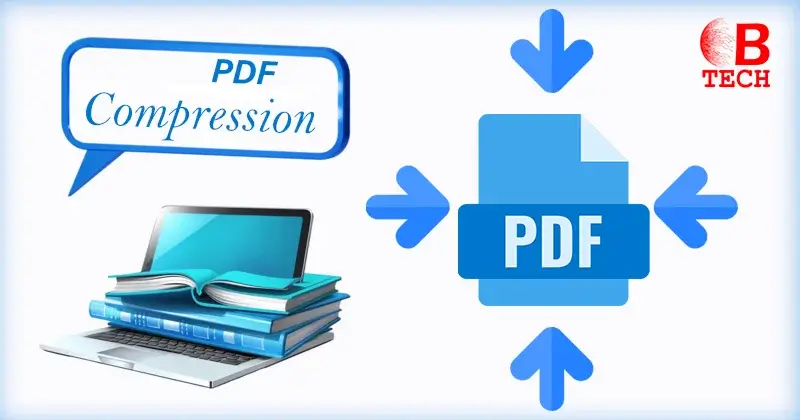The use of Portable Document Format (PDF) has become ubiquitous for sharing important documents, manuals, and reports while ensuring content remains intact across platforms. However, as file sizes grow, the need to reduce PDF file size and efficiently compress PDF documents increases. PDF compression offers numerous benefits that can streamline workflows and optimize digital experiences. This comprehensive guide explores how this powerful tool revolutionizes document management.
Reduced File Size: The Ultimate Space Saver
Compressing PDFs allows you to substantially decrease file sizes, freeing up valuable storage on devices and servers. This is especially beneficial for large files with high-resolution images, complex graphics, or extensive text.
Envision storing and managing thousands of uncompressed PDFs – the space required quickly becomes unmanageable. Utilizing a PDF compressor shrinks these files, optimizing storage capacity so you can accommodate more documents without running out of space. This enhances overall efficiency while providing ample room for other files and applications.
Additionally, compressed PDFs are easier to back up, whether locally or in the cloud. Smaller backups complete faster and take up less space, ensuring your critical data remains protected without consuming excessive resources.
Improved Security
By reducing file sizes, PDF compression can enhance document security and mitigate potential risks associated with transmitting or storing large files. Smaller files are less likely to trigger security alerts or raise suspicions, reducing the chances of legitimate documents being flagged or blocked by antivirus software or firewalls. This benefit is particularly valuable for organizations that handle sensitive or confidential information, ensuring that critical data can be shared and accessed without unnecessary barriers or interruptions.
Compliance with File Size Limits
Many platforms and services enforce file size restrictions to prevent overloading servers. By compressing first, you guarantee PDFs comply with limits when uploading, sharing or storing in learning management systems, regulatory portals, cloud storage and more.
Avoid rejection errors and ensure seamless integration with the online tools and platforms critical to your organization’s operations. Compression makes file size compliance effortless.
Faster File Transfers and Sharing
Compressed PDFs upload and download much faster than larger originals, which is beneficial when sending via email, cloud storage, or collaborative systems. Smaller sizes translate into quicker transfers, enabling seamless file exchanges even with slow internet.
Visualize yourself waiting endlessly for a huge PDF to upload or download, hindering deadlines and collaboration. Compression significantly reduces these delays, ensuring uninterrupted workflows when sharing with colleagues, clients or partners globally.
Moreover, many online services have upload limits. Compressing first ensures your PDFs comply with size restrictions for smooth transfers without rejections.
Environmentally Friendly
Compressing PDFs can also contribute to environmental sustainability efforts. Smaller file sizes require less energy for storage, transmission, and processing, resulting in a lower carbon footprint. As businesses and individuals become increasingly conscious of their environmental impact, adopting practices like PDF compression can be a simple yet effective way to reduce energy consumption and support eco-friendly initiatives.
Regulatory Compliance
In certain industries, regulatory bodies or government agencies may impose strict requirements regarding the storage and transmission of sensitive documents. By compressing PDFs, organizations can ensure compliance with data privacy regulations, security protocols, and industry standards. Smaller file sizes reduce the risk of data breaches or unauthorized access, providing an additional layer of protection for confidential information.
Improved Email Efficiency
Email remains crucial for professional communication, but large PDFs can overwhelm inboxes and servers, causing delays and delivery failures. Compressing attachments minimizes strain while complying with providers’ attachment size limits.
Imagine an important contract or proposal failing to reach its recipient due to an oversized attachment. Compression ensures your time-sensitive PDFs arrive promptly without burdening email infrastructure.
Enhanced Mobile Compatibility
Accessing PDFs on smartphones and tablets is increasingly important, but large files strain mobile device resources, causing slow load times, sluggish performance, crashes and freezes. Compressed PDFs optimize for smooth viewing and editing on the go.
Review documents effortlessly while commuting without lag, even on devices with limited specifications. Compressed PDFs provide a seamless, uninterrupted mobile experience perfect for today’s busy professionals.
Improved Website Performance
For businesses hosting PDFs online, large file sizes directly impact website performance and user experience. Slow-loading PDFs frustrate visitors and negatively affect search rankings.
Compressed PDFs enhance page load speeds, ensuring visitors can quickly access and download content without excessive delays that drive them away. This contributes to better overall user experiences and potentially higher search visibility.
Reduced Bandwidth Usage
In addition to saving storage space, compressed PDFs consume less bandwidth when transferring over networks and the internet. This benefit is particularly valuable for organizations with multiple office locations or remote teams that frequently share large files. By reducing bandwidth usage, businesses can minimize costs associated with data plans and internet services while ensuring efficient collaboration and communication.
Archiving and Long-Term Storage
For organizations that need to maintain extensive archives or engage in long-term document storage, compressed PDFs offer a practical solution. By minimizing the space required for storing large volumes of documents, businesses can significantly reduce the costs associated with physical storage facilities or cloud-based archiving services. This not only translates into financial savings but also streamlines data management processes, making it easier to locate and retrieve specific files when needed.
Integration with Existing Systems
Implementing PDF compression can seamlessly integrate with existing document management systems, content management platforms, and enterprise resource planning (ERP) software. Many of these solutions already include built-in compression capabilities or support third-party compression tools, enabling businesses to leverage the benefits of PDF compression without disrupting their current workflows or requiring extensive system overhauls.
Compatibility with Legacy Systems
While modern systems and software are designed to handle large file sizes, many legacy applications and older devices may struggle with processing and displaying bulky PDF documents. By compressing PDFs, businesses can ensure compatibility with these older systems, extending the lifespan of their existing infrastructure and avoiding the need for costly upgrades or replacements. This can be especially beneficial for organizations with limited budgets or those operating in specialized industries where legacy systems are still widely used.
Efficient Collaboration
These days, efficient collaboration is essential for business success. Compressed PDFs facilitate smoother collaboration by reducing the time and effort required to share and access documents. With smaller file sizes, team members can easily exchange information, provide feedback, and make revisions without encountering delays or technical issues. This streamlined collaboration process can lead to improved productivity, faster decision-making, and better overall team dynamics.
Simplified Version Control
For organizations that rely on version control systems to manage and track changes to important documents, PDF compression can be a valuable asset. By reducing file sizes, compressed PDFs require less storage space within version control repositories, enabling more efficient storage and management of revision histories. Additionally, smaller file sizes can streamline the process of comparing and merging different versions of a document, as the system needs to process less data. This can lead to faster turnaround times and smoother collaboration workflows.
PDF compression offers a powerful solution for streamlining workflows and optimizing digital experiences. From reduced storage needs to faster file transfers, and enhanced mobility to improved website performance, and assured compliance – the benefits are substantial. Embrace compression to harness its full potential for efficient document management, collaborative sharing, and premium user experiences.




This is really interesting, You’re a very skilled blogger. I’ve joined your feed and look forward to seeking more of your magnificent post. Also, I’ve shared your site in my social networks!
I appreciate you sharing this blog post. Thanks Again. Cool.
Nice post. I learn something totally new and challenging on websites